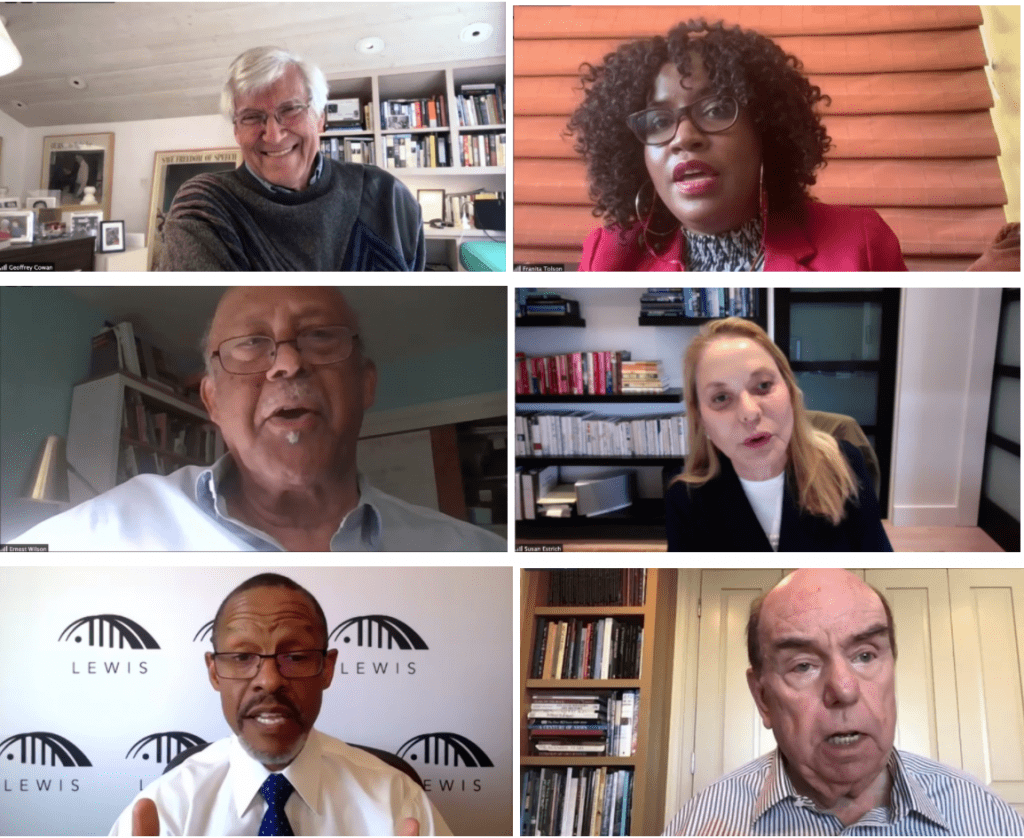By Caroline Wohl
In early November, USC Annenberg’s Center on Communication Leadership and Policy (CCLP) hosted a series of university-wide post-election roundtables surrounding the aftermath of the 2020 election. Co-chaired by CCLP Director Geoffrey Cowan and Professor Ernest Wilson, the interdisciplinary collaboration convened leading authorities and faculty from USC Dornsife’s Center for Political Future, the Gould School of Law and the Price School of Public Policy to understand the long-term implications of the historic election.
“These discussions give students and faculty a chance to learn from the range of disciplines involved in the election and its aftermath,” Cowan said. “We were able to hear from leading political practitioners, reporters, election lawyers, historians, and experts in homeland security.”
The series kicked off the day after Election Day and featured notable USC experts including Gould professors Franita Tolson, who specializes in election and constitutional law, and Susan Estrich, who served as campaign manager for Michael Dukakis’ 1988 presidential campaign. Panelists and attendees discussed the influence of the media and courts on the public perception of the results in a period of heightened partisan tensions and scrutiny.
Former Nixon White House Counsel John Dean III, an attendee of the November 4th event, compared his experience in the Nixon administration to this year’s political atmosphere with the public’s response.
“I think we’re in a very different time,” Dean said. “During the anti-war era of Vietnam, demonstrations were pretty continuous, and Nixon used them as a political tool. I’ve been delighted with how few incidents have been reported so far. I find that very encouraging.”

Among other topics, the November 6th event explored the relevance of political polling, past challenges to U.S. electoral processes and the role of race in voters’ decisions. Ron Brownstein, CNN Senior Political Analyst and Senior Editor of The Atlantic, highlighted the confusion surrounding the results and divisive nature of what he calls this year’s “Antietam election,” referring to the 1862 battle during the American Civil War.
“It’s an expensive clash between two giant armies, where neither one could vanquish the other,” Brownstein said. “At this point, I think that’s what we are in for: several years of grinding partisan warfare and polarization.”
Jessica Yellin, founder of News Not Noise and former Chief White House Correspondent for CNN, noted the role of broadcast networks and misinformation in the 2020 campaign, in addition to consumers’ feelings toward the press’s role in reporting the results.

“There’s this different reality we’re living in,” Yellin said. “The awareness that media networks call a president and our whole system is based on news organizations’ projections is absolutely shocking to most people. It shows how opaque our system has been. People are starting to wake up and learn.”
Following major news outlets’ decisions to call the election in Joe Biden and Kamala Harris’ favor, the November 11th event examined historical precedents for electoral recounts and how the nation can move forward amidst the coronavirus pandemic. Maggie Toulouse Oliver, Current Secretary of State of New Mexico (D) and President of the National Association for Secretaries of State, addressed the integrity of the voting and ballot counting process.

“I have never seen an election so fraught with so many challenges,” Oliver said, “yet so smoothly and effectively pulled off by election administrators across the country as I did with this election.”
USC undergraduate and graduate students were among the attendees who participated in the roundtable discussions. Junior Carina Robles said the event was a great opportunity to engage with differing perspectives that shape America’s political landscape.
“As a journalism major, I was interested in commentary about the press, specifically how the prominence of news deserts impacted the campaign,” Robles said. “I appreciated the chance to ask questions and gain a better understanding of this election’s outcome.”
The ‘What’s Next?’ discussion series is just one of USC’s university-wide efforts to help its community navigate the aftermath of the election. In partnership with the Center for the Political Future, CCLP plans to continue the series next semester to examine pressing issues that arise during the first months of the new Biden administration.
